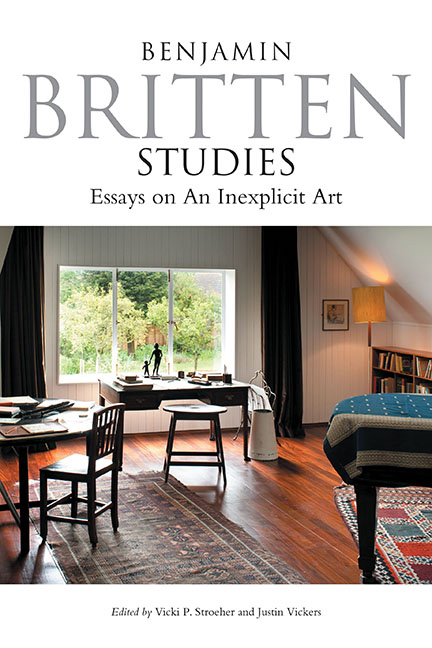Book contents
- Frontmatter
- Dedication
- Epigraph
- Contents
- List of Illustrations
- List of Musical Examples
- List of Tables
- Notes on Contributors
- Acknowledgements
- Bibliographic and General Abbreviations
- Editors’ Preface
- Introduction: Writing About Britten
- Part I Identity: Exile and Return
- Part II Britten and Intimacy
- Part III Britten and His Craft
- Part IV Britten and Matters of Practicality
- Conclusion and Epilogue
- Works Cited
- Index
Introduction: Writing About Britten
Published online by Cambridge University Press: 25 October 2017
- Frontmatter
- Dedication
- Epigraph
- Contents
- List of Illustrations
- List of Musical Examples
- List of Tables
- Notes on Contributors
- Acknowledgements
- Bibliographic and General Abbreviations
- Editors’ Preface
- Introduction: Writing About Britten
- Part I Identity: Exile and Return
- Part II Britten and Intimacy
- Part III Britten and His Craft
- Part IV Britten and Matters of Practicality
- Conclusion and Epilogue
- Works Cited
- Index
Summary
Britten was famously skeptical where words about music were concerned. Unlike his near contemporary Michael Tippett, he found that words about his own music or that of other composers did not come easily to him, and he was a reluctant writer and speaker about music, especially in later life. There are, of course, notable exceptions, not the least of which is his On Receiving the First Aspen Award. But from the outset, music was – and was to remain – his chief mode of expression, his means of communication with the world; it was through music, writing or performing it, that he articulated his ideas. Words about music were not really for him. That was the position Britten was content to be understood by the world at large. The truth, however, is rather more nuanced.
When he was a young composer in London during the 1930s, Britten's general antipathy about the value of writing about music were certainly fuelled by the attitude of certain music critics toward his work. Not all were hostile by any means; but among some there was a distinct view that this brilliantly gifted young man needed taking down a peg or two. The description of his music as being “clever” began to take form as a mantra to be chanted at the appearance of each new work. The thin-skinned, hypersensitive Britten was bruised by their words; as a consequence he mistrusted most critics and critical writing thereafter. In his view, there were very few critics whose opinions of his music were worth a great deal. They were a necessary evil, one at best to be tolerated.
Ironically, at the same time as he was receiving a mixed press for his music in 1930s, Britten was giving full critical vent to his own thoughts about music, old and new, in his diaries and letters. His diaries, more so than his letters, are full of immediate, unguarded responses to the wide range of music he heard in the concert hall, and on the radio and gramophone recordings – and he listened more than most. Performers were praised or dismissed; composers, likewise; early musical enthusiasms developed into lifelong passions (Mozart, Mahler) or eventually dismissed (Brahms, Beethoven).
- Type
- Chapter
- Information
- Publisher: Boydell & BrewerPrint publication year: 2017

